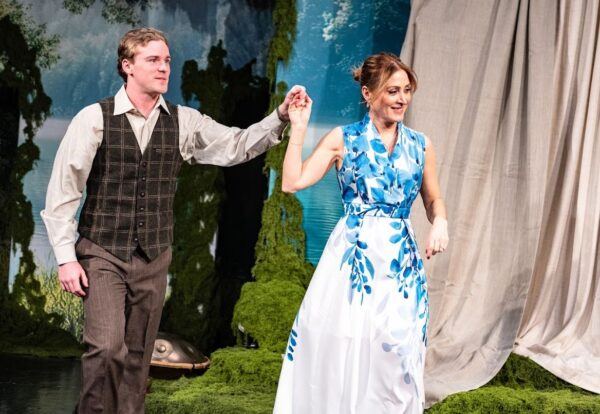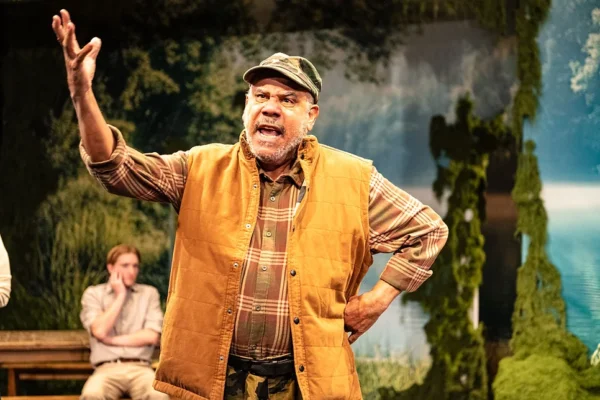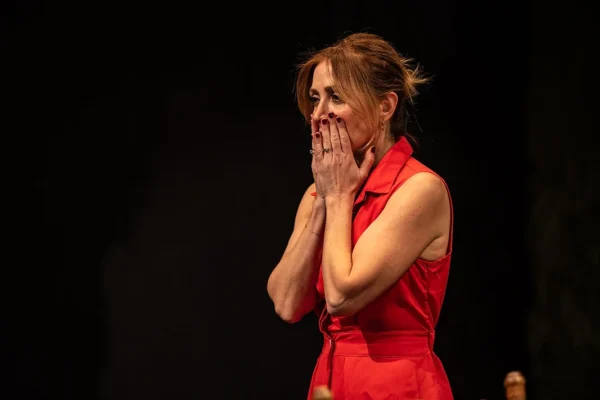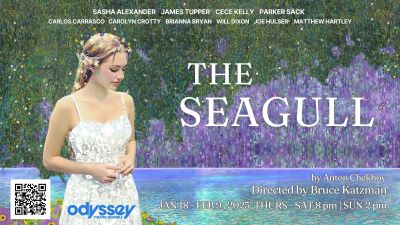Seagulls, as you know, never falter, never stall.
To stall in the air is for them disgrace and it is dishonor.
— Richard Bach, Jonathan Livingston Seagull
Anton Chekhov’s The Seagull, the first of his major plays, has achieved a stature akin to Hamlet in the pantheon. Watching tonight’s visiting production at The Odyssey Theatre, it’s clear why: we see ourselves in these characters, fumbling as they do with desires that both drive and torment us. This is, quite simply, one of the best plays ever written. Its characters feel both rooted in their time and eerily present, suspended between longing and despair, floating towards the here and now.
Parker Sack, Joe Hulser
The summer estate setting is beautifully realized within the confines of the intimate theatre. Carlo Maghirang’s scenic design and Eva Zapata’s costumes gesture not so much towards the period when the play was written, but towards a non-present, intermediary space like summer itself, evoking a timeless, dreamlike realm—neither wholly past nor present—between youth and age, aspiration and sorrow. Further immersing us under Bruce Katzman‘s astute, sensitive direction is Clare Marie Nemanich’s sound design and W. Alejandro Melendez’s lighting, conjuring a summer night’s lake and the melancholy rain of the final act.
Parker Sack
This production does start shakily, with Parker Sack struggling to capture Treplev’s fragile and deluded essence. Yet this awkwardness ironically complements the character’s mediocrity as a playwright, emphasized in the disastrous play-within-the-play. Sack’s stiffness mirrors Treplev’s artistic inadequacy as an artist and paramour (he is in love with Nina) underscoring Nina’s inevitable gravitation toward the older, more successful writer, Trigorin, also on the estate for the summer. To make matters worse for Treplev, his narcissistic famous-actress mom Arkadina, in a relationship with Trigorin, seems capable of starring in every role except the one she absolutely refuses to play; that of a mother. And so Sack’s frustrating woodenness and lack of interesting choices correspond to his character’s mediocrity, and it makes complete sense why Nina would be more intrigued by Trigorin (as, in a twisted way, Treplev is himself).
Carolyn Crotty, Will Dixon
James Tupper, Cece Kelly
Cece Kelly as Nina and James Tupper as Trigorin are triumphant. Nina simply can’t understand that famous people are just people. As with many humans today, Nina thinks successful artists are not as miserable as anonymous average folks, who by definition must be. Nina’s naïve idolization of fame is achingly relatable, as is her painful disillusionment. Unlike Treplev, she will exit this delusion, and, at least with respect to her profession as an actress, grow greatly and become the voice of maturity, though her unshakable attachment to Trigorin underscores the play’s unresolved heartbreak. Her declaration of enduring love for the man who abandoned her impregnated in the big city–which ironically functions as that remote place where dreams go to wake up, and die–is as poignant as it is tragic; the play offers no solution.
Joe Hulser, Parker Sack, Sasha Alexander, Brianna Bryan, Matthew Hartley, James Tupper
 Parker Sack, Sasha Alexander
Parker Sack, Sasha AlexanderA particular stretch of Kelly and Tupper’s acting excellence comes at the end of Act II, when Trigorin attempts to disillusion Nina about the writer’s life: “I see a cloud shaped like a grand piano. I think: I must mention somewhere in a story that a cloud went by, shaped like a grand piano.” For anyone consumed by the need to write, his complaint carries a bittersweet charm, revealing the compulsion, the pursuance, the burden, the dream of creation. For Nina, still captivated by the idea of fame, the moment encapsulates her inability to see beyond Trigorin’s surface—a tragic misunderstanding that will define her journey.
 Brianna Bryan, James Tupper
Brianna Bryan, James TupperCece Kelly, Carlos Carasco, Lukas Jann (holding curtain), James Tupper
Also notable is the remarkable Sasha Alexander as Treplev’s mother, Arkadina, who is, yes, narcissistic, but that self-absorption masks a deeply afflicted soul. When she hurls “nonentity!” at her son–the worst thing she can say–the harsh insult boomerangs back at her, bending her spirit. Alexander’s care for her character makes someone else emerge: locked in a fraught, fearfully unspoken bond with her son, this is a widow burdened by social expectations, battling the cruelty of a world which sees her as less valuable than the younger, sparkling Nina (she is, after all, in show business).
Will Dixon, Parker Sack
The wonderful Will Dixon is a standout as a helplessly attractive Dr. Dorn, the only character who shows real care for Treplev. After Treplev’s disastrous play is declaimed by Nina for a mostly mocking audience , the doctor says he actually liked it. In contrast, Joe Husler delivers a subtle performance as Sorin, Arkadina’s brother, a judge who wanted to be a great artist and a great husband, but was neither–just a judge.
 Matthew Hartley, (back) Carlos Carrasco
Matthew Hartley, (back) Carlos Carrasco
Cece Kelly, (back) Parker Sack
The two-year gap between Acts 3 and 4 reveals Trigorin–that noble figure–to be a shit, returning to the estate as a man in moral decay who has shattered Nina’s life with an ill-advised affair. He has nothing to do now but hang his head and hem and haw. Treplev is entrapped in a cycle of self-abasing pursuit–his futile longing for maternal affection, his doomed artistic ambitions, and his masochistic devotion to the uninterested Nina all culminate in tragedy.
 Sasha Alexander
Sasha Alexander James Tupper
James TupperThe final gunshot, one of the more famous reports in stage history, is freshly startling here. Has Treplev succeeded in anything, even suicide? Whatever his fate, Alexander’s Arkadina, seated at the table in chilling stillness, silently answers the question with her wounded gaze. The doctor’s futile attempts to shield her from seeing her son underscore her deeper understanding—she knows what’s happened, and probably why as well.
photos by Cooper Bates
graphic design by Peter Simpson Cook
The Seagull
visiting production at Odyssey Theatre Ensemble, 2055 S. Sepulveda Blvd
Thurs-Sat at 8; Sun at 2
ends on February 9, 2025
for tickets ($20-$40 +$3 for credit card), call 310.477.2055 ext. 2 or visit Odyssey Theatre
for more info, visit The Seagull, Facebook and Instagram
*Wine Night Fridays: Enjoy complimentary wine and snacks
after the show on the third Friday of every month.

